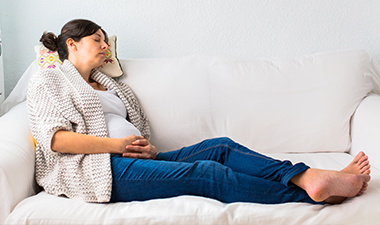Symptoms of pregnancy
 Every pregnant woman is different. Some will sail through pregnancy with very few symptoms, and others will be dogged with multiple discomforts throughout the 9 months. There are lots of ways to manage any symptoms that arise, and no matter what the discomfort, at the very least you know with certainty that it is temporary!
Every pregnant woman is different. Some will sail through pregnancy with very few symptoms, and others will be dogged with multiple discomforts throughout the 9 months. There are lots of ways to manage any symptoms that arise, and no matter what the discomfort, at the very least you know with certainty that it is temporary!
Symptoms of pregnancy vary from woman to woman over the 40 weeks of pregnancy.
The most common symptoms are:
- Fatigue. Women may often feel tired or fatigued soon after becoming pregnant.
- Fainting. Some women may feel faint or lightheaded early on in their pregnancies.
- Breast changes. Breasts may begin to feel tender and/or swollen and heavier. The areola (the circle of skin directly surrounding the nipples) may become darker.
- Constipation, gas or bloating.
- Nausea/morning sickness. This is a common symptom of pregnancy, although it is also a very common symptom of other illnesses such as the flu. Even though it is called “Morning” sickness, you may vomit or feel nauseous at any time of the day. Nausea may sometimes be triggered by the taste or smell of food. See the section on nausea and vomiting for help with this symptom.
- Frequent urination.
- Backaches and headaches. Backaches are common during pregnancy and can sometimes start early. Headaches can also be a problem in pregnancy.
- Mood swings. There are many reasons women may experience mood swings during pregnancy and they are not usually severe. Depression or disruptive mood swings are not normal and it is important to seek help for these more serious concerns.
- Cramping. Many women experience leg cramps during pregnancy. Gently stretching out the cramp is the best way to stop the cramp.

